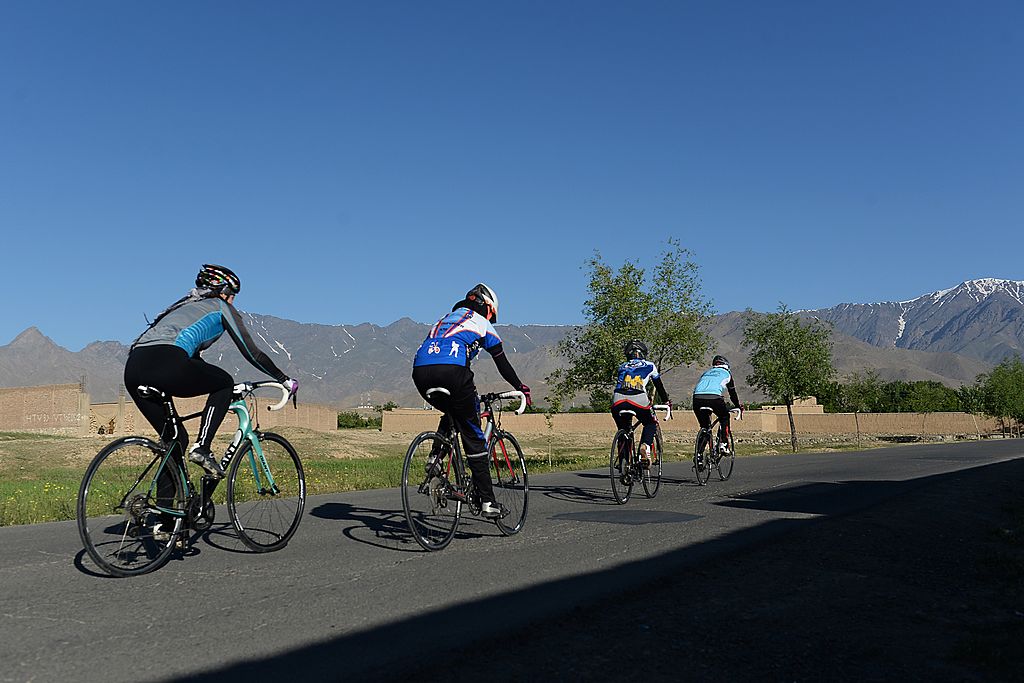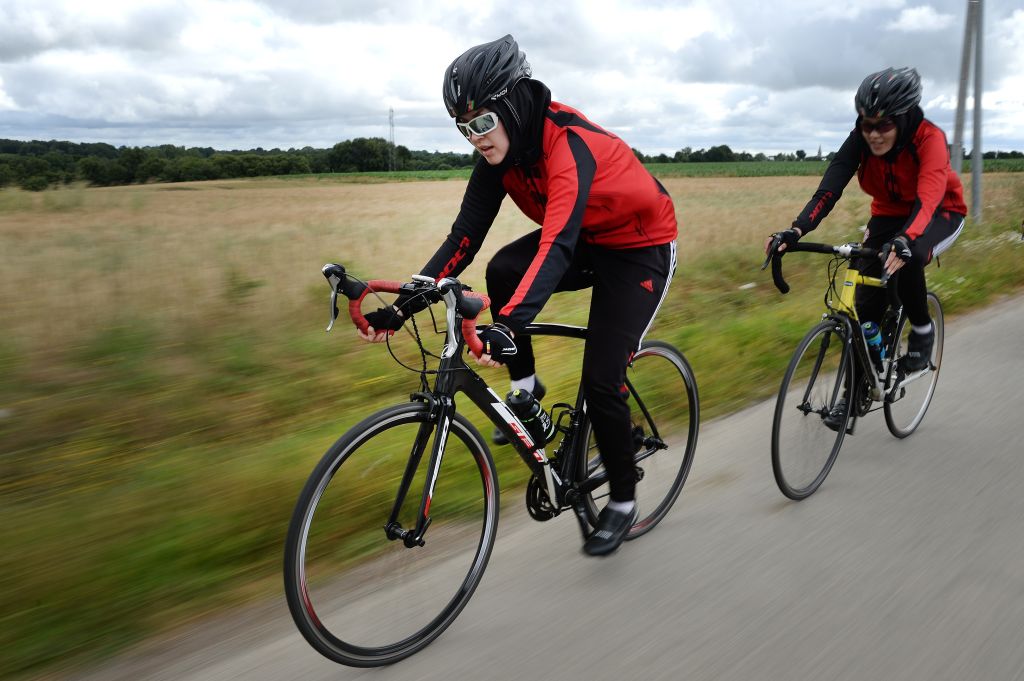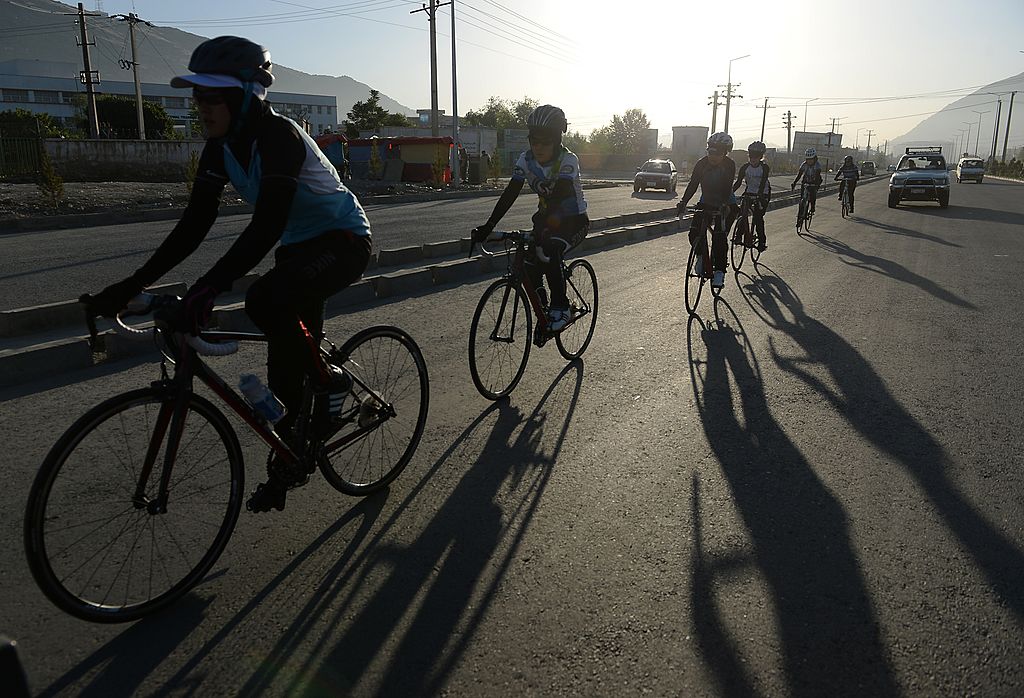UCI helps some Afghan women cyclists reach Switzerland as window to flee closes further
Group of 38 to get asylum, includes Afghan Federation president and his family

More than one month on from the first evacuation of the female cyclists who risked their lives to create their sport in Afghanistan, the latest convoy of athletes and their families have finally reached safety, with a group of 38 evacuees landing in Geneva where they were welcomed by UCI President David Lappartient.
"It is very important for the UCI to make a commitment to the members of the cycling family who are suffering due to the current situation in Afghanistan, and I am delighted that our efforts in this respect are providing opportunities for the people concerned in decent living conditions," said UCI President David Lappartient said in a press release.
The UCI and the Israeli NGO IsraAid have been part of a team working tirelessly to extract the members of the women's cycling movement in Afghanistan after the Taliban overthrew the government in August. The Taliban have banned women from participating in sports where they would be visible and look set to reimpose the strict laws of their previous terror reign.
The latest evacuation comes more than a month after a group of 30 riders escaped on a separate convoy.
Afghan women cyclists plead 'please don't stay silent'
Afghanistan: Women cyclists fear being left behind with evacuation options dwindling
Afghanistan: Right to ride revolution stops as women face targeted violence by Taliban
Afghanistan's female riders look to flee the Taliban amid fears for their lives
Masomah Ali Zada brings message of hope for women’s rights and refugees at Tokyo Olympics
The group of evacuees who have been given official refugee status in Switzerland includes the family of Afghan Cycling Federation (ACF) President Fazli Ahmad Fazli, who was already in Europe, having been lauded by the UCI at the World Championships in Belgium and awarded a UCI Merit "for his courageous commitment to the development of cycling, notably women's cycling, in a country where fighting for this cause is a risk."
The UCI worked with Fazli to select some of the riders to include on the list, with the NGO IsraAid helping secure passports and visas for a group of 125 Afghans. Israel Start-Up Nation owner Sylvan Adams funded the flight out.
It was a delicate diplomatic operation involving several countries willing to allow the flight to land and hold the evacuees until they could secure a safe final destination, involving the governments of Switzerland, France, Canada, Albania, the United Arab Emirates and Israel, among other countries.
The latest race content, interviews, features, reviews and expert buying guides, direct to your inbox!
Philippe Leuba, Head of the Department of the Economy, Innovation and Sport of the Canton of Vaud, spent the whole of last week in Tirana, Albania to facilitate entry for the group into Switzerland.
Speaking exclusively to Cyclingnews, Lappartient was pleased to announce the larger group's safe arrival after weeks of round-the-clock efforts.
"We've been working very closely between the UCI and CEO of IsraAid Yotam Polizer, myself to bring 125 people outside of Afghanistan," Lappartient said. "It's been a long story - almost a month - but now I'm very happy to say all of this group are now in Albania, and from Albania they will join other countries.
"Among them, half are cyclists – female cyclists or members of the cycling family – or journalists, people fighting for human rights, artists, judges - all people who were very troubled. Two-thirds of the list was proposed by UCI and one third by IsraAid and we joined forces for this."
The list
It was a life-and-death effort to save the most vulnerable athletes and their families, along with other Afghans who feared reprisals from the Taliban – a judge who was key to cracking down on sexual abuse of female members of the Afghan Football Federation, a young pianist, diplomats and others in addition to the women cyclists and members of the cycling federation.
The list itself became highly contentious. Human rights activist Shannon Galpin, who was instrumental in supporting and training the first riders of the women's cycling movement in the early 2010s, was asked by the Afghan Cycling Federation (ACF) to consult with assembling a list of riders to evacuate in August after the sudden Taliban coup.
In early September, a joint effort with Galpin, the international law firm Hogan Lovells, and other partners were successful in extracting 30 riders but the news was not lauded by the ACF, who were assembling their own list of riders for the UCI-led effort.
The ACF threatened to revoke UCI licenses from riders who it felt were misusing their licenses to gain priority for evacuation and questioned the legitimacy of the riders who had been evacuated, saying they were not 'real cyclists'.
Lappartient confirmed to Cyclingnews that the riders had not been suspended since there is no way to have a disciplinary commission set up in Afghanistan but he emphasized that the list of riders prioritized those who were in the most immediate danger from the Taliban.
"This kind of situation is always subject to tension because when you are not on the list you can always complain that some people on the list are maybe not as important as the one you feel you must have for yourself," Lappartient said.
"I wanted to be sure that all of them were cyclists, and not family members and so on, that they were really cyclists. Some of the people who were not on the list – they were claiming – most of the time it was men… and they wanted to bring people who had nothing to do with cycling. Of course, I can fully understand that some of them are claiming they weren't in the group but it was not possible to bring everybody."
Lappartient said the list included the family of the ACF president - his wife and six children - at his request, not at the request of Fazli. "The priority was first to save lives," Lappartient said, adding that the Taliban had come looking for Fazli because he was so prominent in the promotion of women's cycling.
"I can not have his family in another country," Lappartient said.
Selecting who got on a flight with 125 seats was a huge responsibility, Lappartient said. "I assumed the responsibility for this because someone has to, but it is not so easy. The UCI and FIFA are the only international federations to bring anyone outside. At least we've done something - we can discuss the list - but at least we've done something and we have some cyclists and at the moment that's the best we can do.
"In the end, we will save lives, that's the most important (thing), but we are also deciding about the future of these people. That's a huge responsibility for us.
"We [initially] had permission for 24. We enlarged it to 100 and finally, it was 125 - 101 more than the first agreement," Lappartient said. "Of course all of them are not cyclists … We have a judge who was in charge of sexual abuse [investigation of soccer] in Afghanistan, so she was really in danger. We had FIFA was asking me if we could put her on the list and I said yes. Maybe instead of three cyclists, that's true. But at one moment we have to decide. We've done our best. Each time it was always the most dangerous situation. The judge was with her husband and daughter were in a very difficult situation."
Lappartient said the UCI will continue to support the ongoing efforts to get the remaining riders out of the country. However, the limiter is finding countries to host the evacuees in the long term.
"For us, the goal is to protect as many cycling members as possible. But we also took some lessons from this that we have to work on the ground but we also have to secure final hosting countries. That's a very hard diplomatic job. That's sometimes (something) only the UCI can do to reach the level of discussions with chiefs of states, heads of governments.
"We also know that some countries will be happy to help with transit but will ask you to secure a final hosting country." Without a final destination, the evacuees could end up stranded in transit and that would cost the UCI its credibility with those countries.
"If we want to make a second wave at least we need to make sure to show them we took care of the first group and they are now all safe and in good conditions."
Settling down

It has become clear over the past six weeks that it is not possible to simply extract the female cyclists from Afghanistan and plunk them down alone in a foreign country with no support structure. Lappartient was involved in settling Olympian Masomah Ali Zada's sister with her in France in 2017 and understands the importance of continuing to care for the refugees.
"We took care of the sister because when you arrive in a country and you don't speak the language, it's a different culture – we don't say now you are safe, do this alone. No, we have to really take care about everything. that's a lot of work."
Expanding the list of evacuees isn't just about getting them out of the country and Lappartient wants to make sure it's done properly.
"We don't want to make too much noise about what we are doing - we don't want to put our face - we just want to do it. That's why we've been quiet on what we've done since the beginning. Everybody wants to help, I don't want to have any tension with anybody on this.
"To have people in transit, you have to have passports, you have to have visas for the people in Afghanistan. That's a hard job. Some of my assistants were working in the middle of the night because we have to do this. Everybody was really involved, that's what we have to do."
Those left behind
To date, the various efforts to get people associated with the cycling movement out of Afghanistan have resulted in 17 being settled in France or Canada, another group of 30 or more currently awaiting finalization of their visas to Canada in addition to the 38 now in Switzerland.
The success of the UCI's convoy was not exactly celebrated by Galpin, who has been a first-hand witness to the abuses at the hands the ACF's previous president, Haji Abdul Sediq Seddiqi, who was forced out of his post over misappropriation of funds and other abuses.
Galpin objected to the UCI deciding who got on their flight based solely on the input from Fazli and viewed the inclusion of Fazli's family in the UCI convoy as a failure to prioritize getting the most vulnerable female cyclists out. The list left behind some 40 or more riders who were not able to make it to Kabul with the group she helped get out in September.
"The UCI could have combined with me and we could have work to get visas for all of the cyclists that they have assisted. They gave the president and his family visas over female cyclists," Galpin said.
A series of social media posts on the ACF channels didn't help her view of the Afghan federation, in particular, accusations that Galpin was a 'fraud' for evacuating riders who weren't 'real cyclists'. They also threatened to revoke the UCI licenses of riders who used them to get priority in the evacuation.
The federation have asserted that they are the only "authorized entity for cycling in Afghanistan" and any fundraising "should be with our approval and cooperation of federation", ACF President Fazli told Cyclingnews in an email.
Galpin said it was within the rights of the UCI and ACF to select who would be evacuated as part of a convoy that left the country on September 30, but she questioned their prioritisation of male federation staff and families ahead of the women.
"It's not unusual, but it's disgusting that these riders risked their lives to ride a bike and now these men are bullying them and impeding their evacuation," Galpin said.
"I don't care about this convoy. I care that UCI doesn't care about having a conversation or understanding about harassment and bullying or leaving cyclists behind," she added before vowing to continue her efforts.
"We got people out before this convoy and I've gotten people out after this convoy… I care that once again men are determining whether or not women are worthy of being called a cyclist or of evacuation."
The future of Afghan cycling

With the Taliban in power and sports now the domain solely of men, the future of cycling for Afghan women now seems impossible for those who have not escaped the country. Whether the country will remain in the Olympic movement remains to be seen but seems unlikely.
"That's a very good question. It's a bit the same for IOC, they still recognize existing [Afghanistan Olympic Committee] and we still recognize ACF," Lappartient said.
"Of course [one part of] the federation will be based here and one part will be based in Afghanistan. This is something we need to evaluate with the federation itself. At this point, we still recognize the existing ACF and the existing president.
"We had a discussion for example with the Ministry of Sport [in France] and we said with all the women cyclists we will have in Switzerland, France and Canada, maybe next year we have to organise the Afghanistan cycling federation exhibition just to show cycling is still existing in the country. But at the same time, it was not the priority. The priority was first to save lives."
Galpin, in addition to working on getting the remaining riders out, is also looking further down the road to try to keep the team together.
"My long-term plan is to bring the riders together occasionally once they are able to travel so they can stay connected to each other through cycling and outdoors. I've already reached out to a few people in the cycling industry to support."

Laura Weislo has been with Cyclingnews since 2006 after making a switch from a career in science. As Managing Editor, she coordinates coverage for North American events and global news. As former elite-level road racer who dabbled in cyclo-cross and track, Laura has a passion for all three disciplines. When not working she likes to go camping and explore lesser traveled roads, paths and gravel tracks. Laura specialises in covering doping, anti-doping, UCI governance and performing data analysis.